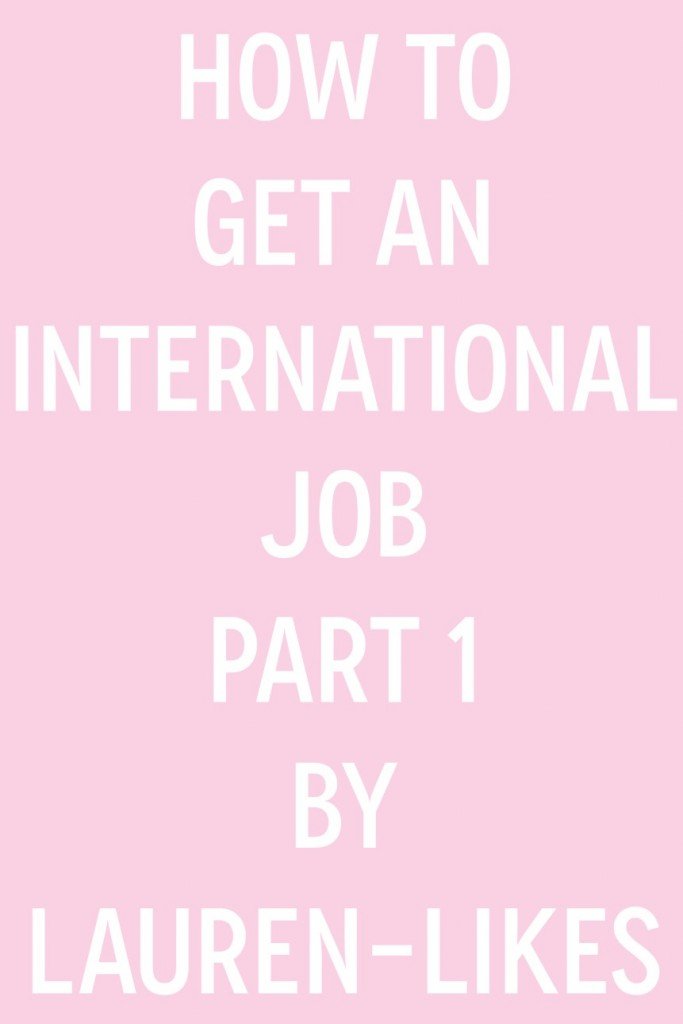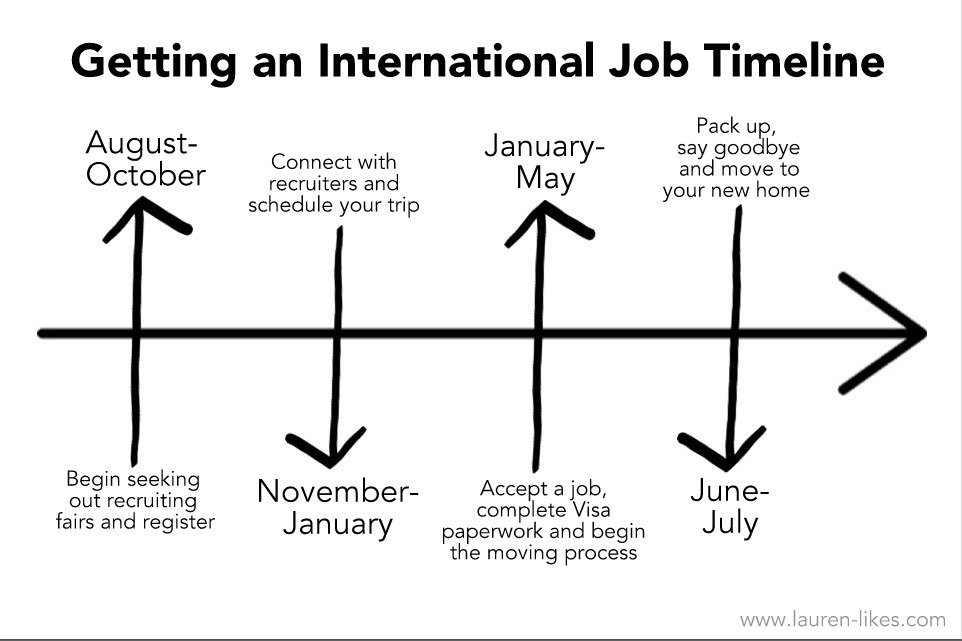How to get an international job part 1

 When we got our teaching jobs in Korea everyone had tons of questions about how we did it and it was honestly very hard to answer because it took literal years of planning and research. There are so many options of how to get an international job and everyone's experience looks different, so there isn't really an easy to follow roadmap. So I thought I would make one by sharing our journey and give you a little direction if you think this path may be for you.This will be the first part in a series of posts detailing our process.I am in no means an expert on this, but this is my experience of how we got our international teaching jobs. There are many routes you can take and everyone's journey looks different. I did an extensive amount of research and reached out to tons of people who had experience doing this, in real life and through the web. So I encourage you to do the same to find the path that is best for you! Hopefully i have broken down the process in a general and understandable way. Please add your suggestions/story in the comments and ask any questions you may have! Ways to work internationally:
When we got our teaching jobs in Korea everyone had tons of questions about how we did it and it was honestly very hard to answer because it took literal years of planning and research. There are so many options of how to get an international job and everyone's experience looks different, so there isn't really an easy to follow roadmap. So I thought I would make one by sharing our journey and give you a little direction if you think this path may be for you.This will be the first part in a series of posts detailing our process.I am in no means an expert on this, but this is my experience of how we got our international teaching jobs. There are many routes you can take and everyone's journey looks different. I did an extensive amount of research and reached out to tons of people who had experience doing this, in real life and through the web. So I encourage you to do the same to find the path that is best for you! Hopefully i have broken down the process in a general and understandable way. Please add your suggestions/story in the comments and ask any questions you may have! Ways to work internationally:
- Just move somewhere and look for a job (be sure to find out which countries this is legal in)
- Get a generic work visa, move and look for a job (in a specific country)
- Have your job transfer you (Caylee's husband did this when they lived in Germany)
- Seek out and choose to work at a company that sends people to international branches, etc
- Teach english (generally all you need is a college degree in anything) through a country's government or an english teaching company that will place you somewhere. Our friend Caroline is teaching in Korea also through Epik
- If you are a teacher/certified school employee, apply for international teaching jobs in your field (which is what we did and what this post will describe). Use agencies such as Search Associates, ISS (Jamie is a great example of someone who used this agency), UNI (who we used)
- Apply to jobs in your field internationally (just use google to search for job openings, they are out there!!)
- Go be a missionary (talk to God first of course)
- Peace Corp
- Military
- Work for the DOD on a base (they have a slew of jobs available)
- Even more ideas for those looking to move without a specific career in mind
Time Line options:1. Fast and Furious: Decide to go to an international teaching job fair the week of and accept a job and move 4 months or less later (we have friends who did this!!). I don't recommend this route as it is much more stressful, but just like any school, they will be filling positions up until the first week of school, so it's never too late technically. I recently met someone who moved their whole family within 10 days for a position! Crazy, but doable! 2. Slow & Steady (Our timeline):
2. Slow & Steady (Our timeline):
- 2 Years in advance:
- Decide almost 2 years in advance this is your plan
- 2 years before you are ready to board a plane: do general research and figure out the hiring timeline and requirements and what you need to do to be prepared for these. (this step is more just a mental preparation thing, but you may need to get an additional certification, etc so this gives you a year to do this before starting the stressful job search)
- August 1 year prior to your preferred move date
- research international job fairs, schools, options, etc
- September-October:
- Choose a job fair/recruiting program (note you can find a job on your own by applying directly to schools, but 95% of the time they will want to interview you at a fair. Being part of a program gives you support and guidance also!)
- Reach out to the different companies to figure out who is the best fit
- We spoke with the main largest recruiter companies in the USA, Search Associates, ISS, Teachaway and UNI. We chose UNI for multiple reasons: they were the friendliness and most helpful, they accepted me as a school social worker (Some companies work strictly with teachers), they were the cheapest fair (registration wise) and they take applicants with less experience than others may (teachers right out of college). We cannot speak highly enough of this organisation and fair. They were just wonderful and personable to work with every step of the way.
- November:
- Most deadlines are around Thanksgiving to be completely registered for a fair to not incur a late fee or be wait listed
- December:
- Complete job fair registration and book your hotel, flight, etc
- It took us months to complete the registration process as we had to apply for a few certifications and wait on them to come in since T was still in grad school, so this stretched our process but if you are currently teaching you should be certified and not have this worry. But the paperwork is VERY extensive and you need multiple references. So start as soon as you choose a company!
- By December you should be completely registered and in the database. This allows you to have access to all the job openings (many times these schools will not post online, but will only post through these companies as the company does all the up front paperwork work making sure all applicants actually qualify!) and allows schools to search for you in the applicant database (which is how we got our jobs!!)
- Complete job fair registration and book your hotel, flight, etc
- January-February:
- Most fairs are in January or February, so you should be making travel arrangements in December/January if you need to travel.
- In January you should begin connecting with recruiters from the schools you would like to interview with through email, skype, etc.
- Attend your job fair!
- Normally contract offers are made at the job fair. Depending on the school and the company running the fairs policy you may have anywhere from 30 minutes to 48 hours to decide. These fairs are very aggressive and competitive. Sometimes schools are attempting to hire 30 new staff in a 48 hour period. That means a lot of interviews and if they make an offer and you refuse they need to move on to the next person! This process is not for the faint of heart. Some people receive 8 offers from different schools, some receive none. Recruiters will say no, very rudely, to your face but you must be able to quickly let that go and move on to the next school!
- February-May:
- Once you have decided and your contract is signed and you've told everyone and celebrated the hard work begins!!
- You should know what your housing situation will be, furnished versus not. So you need to begin deciding what you will do with your belongings, home, cars, etc.
- Begin sorting and selling and donating things immediately to make it easier on yourself in the end.
- Your school will work with you over the next few months to complete paperwork and get your Visa. Do not wait!!
- If your school is having you purchase your own ticket and is reimbursing you (which is the general policy) you should purchase your plane ticket about 3 months out or earlier (again consult your school). We bought ours in April and got a great deal.
- June-July:
- If you are shipping items it takes about 6-8 weeks to get there
- Over the summer say your goodbyes and soak up your home!
- Your school may send you to a training or conference, so be prepared to be a little flexible in these months.
- July:
- its time to move!
- Get to your new home, settle in and start orientation!
- August:
- School starts in full swing in!
- September:
- Be amazed at where you actually are!
Next up: Surviving an International teaching job fair, Paperwork and the transition process, Were here! Officially becoming expat teachers and what that meansQuestions? Comments? Are you working abroad? Tell me how you did it!
